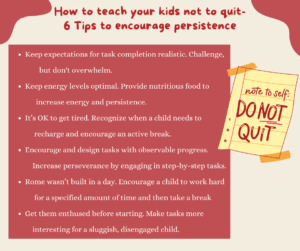Does your child lose energy quickly when starting homework or chores? Do they give up too quickly or struggle with sustaining their effort on step-by-step tasks? Some children tire rapidly when engaged in stressful physical or cognitive activities, and others want to quit once they experience a small bit of frustration. It is too easy to look around at peers and think that others’ achievements have come easily to them. Parents and teachers know that this is not true, but they may lack the right strategies to use when encouraging kids to choose not to quit. Recognizing a child’s difficulty in sustaining his effort on short-term tasks can help parents and teachers identify specific strategies to energize a child. Parents and teachers cannot manufacture motivation and persistence for kids, but they can use strategies that can help sustain short-term energy and persistence.
Some kids really struggle with task persistence, and one of the things that might be happening is they could be struggling with their use of executive functions, specifically flexibility. Flexibility and other executive functioning skills is one of the things that we examine when we work with kids at South County Child and Family Consultants. At SCCFC we perform neuropsychological evaluations on children to better understand the way their brain works and why they are the way that they are. Its not uncommon to have problems with flexibility, as it is a common symptom of ADHD and it is even seen in children with Autism Spectrum Disorder. If you are interested in a neuropsychological evaluation with us to better learn about your child, please contact us below.
Below are 6 useful tips to help encourage persistence in kids that are quick to quit.
1. Keep expectations for task completion realistic. Challenge, but don’t overwhelm.
It is important to build upon known strengths ad earlier successes when working with youngsters to increase their ability to follow through on tasks. Agree upon an accurate assessment of a child’s capabilities and match the complexity of tasks to that skill level. For instance, once they have used their organizational skills to put away the clean silverware, “promote” them to putting away the plates and bowls. Once they have used hand tools to assemble a toy they might be able to help construct a bookcase you are making. Asking them to describe a relevant experience such as using the tool on a different project could support their confidence in their ability to complete the present task. It is important to challenge them to show them that they can accomplish hard tasks, but it is equally as important to not challenge them an unrealistic amount which can lead to them feeling overwhelmed. Also having them detail the things they can do now that they could not do a year ago in areas such as math, sports, and self-care to highlight their progress in these areas.
2. Keep energy levels optimal. Provide nutritious food to increase energy and the executive function of persistence.
Have a supply of nutritious, high-energy snacks for your child to assist them with task persistence. Fresh fruit, granola bars, and other healthy snacks could help them with starting homework and could be used as a reward for pushing through and completing it. Provide protein-based snacks such as milk, cheese and crackers, or yogurt before studying, as protein has been identified as improving the memory process.
3. It’s OK to get tired. Recognize when a child needs to recharge and encourage an active break.
Teaching your child to take 5-to-10 minute exercise breaks when studying or doing homework to help them with task persistence can be very beneficial. Taking a break is not the same as quitting. This could include anything from running around the house, doing a set of push-ups or sit-ups, or taking the dog out for a short walk. Initially, a parent would need to be in charge of when to do this to teach them what the signs of needing a break are and what the breaks should consist of. Eventually, the child should be able to learn when they need a break and to demonstrate that they are using the break responsibly by coming back to work better than before.
4. Encourage and design tasks with observable progress. Increase perseverance by engaging in step-by-step tasks.
Help your child to develop skills that enable them to not give up readily and to persevere in the face of difficulties and possible failure. This could increase their potential for being successful and give them an awareness that their success could depend on the degree to which they are willing to put effort into the task. Starting and completing a task that has many separate steps, such as building a bookshelf, baking a cake, or even making their bed could provide opportunities for frustration and reward. Grit, which is the willingness to persevere in the face of difficulty, is a powerful trait for future happiness and success. Assist your child in experiencing the regards of this by praising their effort and teaching them how to find satisfaction in themself through their efforts.
5. Rome wasn’t built in a day. Encourage a child to work hard for a specified amount of time and then take a break.
Some tasks may be particularly grueling for a child. For example, there are many kids who readily complete their math homework, but struggle for hours with written work. Agree upon specified amounts of time for them to work before taking a break. Use alarms or timers to let them know when to stop during an activity. They could also be encouraged to use the time to turn a task into a game or competition, such as, “Let’s see how much work we can get done in 15 minutes.” This process could help him to stick with and finish tasks.
6. Get them enthused before starting. Make tasks more interesting for a sluggish, disengaged child.
Children who tend to be sluggish can benefit from hands-on tasks, making tasks into a competition, or meaningful rewards to assist with the completion of homework or chores. Shake things up by having a child read an assignment while riding an exercise bike, doing homework outside when it is cold or raining, blasting some of his favorite music while completing a math assignment, or have them read to you in an accent, to spark and engage their efforts on tasks.
If you are looking to print this document, please select “download this as a pdf” on the top of this page. If you are looking to print the image, please click on the image itself.
If you are local to Rhode Island and are looking to schedule a neuropsychological evaluation with us, please contact us below.
Receive online class information and helpful tips from Dr. Randy Kulman's LearningWorks for Kids |





